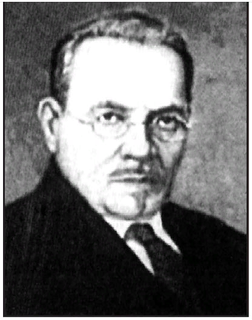Oleg Nikolayevich Trubachyov was a Russian doctor in philology. He was an academician of the Russian Academy of Sciences and served as the editor-in-chief of the Etimologiya yearbook. His works are on the etymology of Slavic languages and on East Slavic onomastics.
Boris Markov - Soviet, Chuvash actor and theater director, People Artist of the Russia, People Artist of the Chuvash Republic, the founder and first director of the Chuvash State Ballet&Opera Theatre.
Alexander Petrovich Kotsubinsky is a prominent Russian psychiatrist, a spokesman of St. Petersburg psychiatric school.
Society for the study of the native land (SSNL) is an association of ethnographers of Chuvashia to study the local region. The Company distributes scientific data on native land, introduces the population of the republic with the life and culture of the peoples of the country.
Simbirsk Chuvash teacher's school is the training center for the creative intelligentsia of the Chuvash and other peoples of the Volga region. Center founded educator of Chuvash people I. Y. Yakovlev, October 28, 1868 in Simbirsk, the administrative center of the homonymous province.
Timofey Petrovich Samsonov was a Russian revolutionary, Soviet politician and veteran of the Russian Civil War.
Karayakupovo culture was an archaeological culture in the Southern Ural. The researchers of Karayakupovo culture together with Kushnarenkovo archaeological culture think these the Ugrians, the ancestors of the Hungarians or ancient Bashkirs.
Chuvash literature — consists of literature written in the Chuvash language, regardless of the ethnic origin of the authors or the place of publication. This term applies to fictional works, but does not include folklore.
Gennady Nikandrovich Volkov was a Chuvash educator, writer and publicist. He was a professor, doctor of pedagogical sciences, and was an academic of the Russian Academy of Education. He founded ethnopedagogics.
The Lopukhin family was a noble family of the Russian Empire, forming one of the branches of the Sorokoumova-Glebov family. Eudoxia Lopukhina married Peter the Great. When Pyotr Lopukhin's son died childless, the family's princely title passed to Nikolai Petrovich Demidov-Lopukhin. The present Prince Lopukhin-Demidov is Nikolai Alexander Paul Demidoff born in 1976.
Praskovia Naumovna Arian, née Belenkaia, was a Russian writer, translator, feminist and educator. She founded the annual First Women's Calendar covering women's issues in Russia and later the First Women’s Technical Institute. She wrote articles under the pseudonym "Ar.". In the 1930s she taught courses for workers at the Kirov Plant in Leningrad.
Ivan Anatolievich Shpitsberg, was a Russian lawyer, journalist, writer, translator, organizer, and head of the scientific society and publishing house "Atheist" (1921), and editor of the eponymous magazine.
Fedor Maksimovich Putintsev was a Soviet propagandist of atheism and a scientific worker in the study of problems of religion and atheism. He was also a journalist and writer.

Konstantin Ivanovich Makarov was a Soviet revolutionary and Putilov worker, member of the RSDLP since 1917.
Anatoly Vasilievich Belov — Soviet religion scholar and propagandist of atheism. He was a First Deputy Chairman of the Council for Religious Affairs under the Council of Ministers of the USSR, an expert on Adventism and one of the authors of the Atheistic Dictionary and Atheist Handbook.

Vladimir Kapitonovich Nikolsky was a Soviet historian, ethnologist, translator, religious scholar, Doctor of Historical Sciences (1943), and professor.
Victor Nemtsev was a Chuvash painter and member of the Union of Artists of the USSR (1967). He was born in the village of Votlany, Komsomol district, Chuvash ASSR, and died in Cheboksary, Chuvash Republic.

Vladimir Konstantinovich Soldatov was a Russian and Soviet ichthyologist, zoologist, Doctor of Biological Sciences, professor of the Department of Ichthyology of the Moscow Technical Institute for the Fishery Industry.
Nikolai Zolotnitsky was a Russian Chuvash linguist and one of the founders of national Chuvash scientific linguistics. He was also a comparative Turkologist, ethnographer, teacher, and public figure.
Valerie Tourgay is a Chuvash poet, novelist and translator, journalist.


